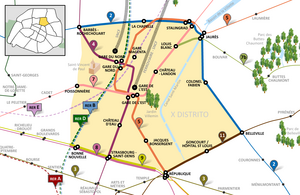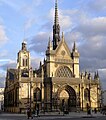Paris Xe Arrondissement
The arrondissement, called Entrepôt (warehouse), is situated on the right bank of the River Seine. It contains two of Paris's six main railway stations: the Gare du Nord and the Gare de l'Est. Built during the 19th century, these two termini are among the busiest in Europe. The 10th arrondissement also contains a large portion of the Canal Saint-Martin, linking the northeastern parts of Paris with the Seine.
The current mayor of the 10th arrondissement is Alexandra Cordebard since 2017.
Geography
The land area of the arrondissement is 2.892 km (1.117 sq mi; 715 acres).
The 10th arrondissement is often referred to as l'Entrepôt. Like all Parisian arrondissements, it is divided into four quartiers (districts):
- Saint-Vincent-de-Paul, the 37th quartier, has 21,624 people in an area of 92.7 hectares
- Porte-Saint-Denis, the 38th quartier, has 15,066 people in an area of 47.2 hectares
- Porte-Saint-Martin, the 39th quartier, has 23,125 people in an area of 60.9 hectares
- Hôpital-Saint-Louis, the 40th quartier, has 29,870 people in an area of 88.4 hectares
Demographics
The peak population of the 10th arrondissement occurred in 1881, when it had 159,809 inhabitants. Today, the arrondissement remains very dense in both population and business activity, with 89,612 inhabitants and 71,962 jobs at last census in 1999. Due to its large Turkish minority, the 10th arrondissement is often called "La Petite Turquie" (Little Turkey).
Historical population
| Year (of French censuses) |
Population | Density (inh. per km) |
|---|---|---|
| 1872 | 135,392 | 46,848 |
| 1881 (peak of population) | 159,809 | 55,259 |
| 1954 | 129,179 | 44,699 |
| 1962 | 124,497 | 43,049 |
| 1968 | 113,372 | 39,202 |
| 1975 | 94,046 | 32,519 |
| 1982 | 86,970 | 30,073 |
| 1990 | 90,083 | 31,149 |
| 1999 | 89,612 | 30,986 |
| 2009 | 95,911 | 33,187 |
Immigration
| Born in metropolitan France | Born outside metropolitan France | |||
|---|---|---|---|---|
| 70.4% | 29.6% | |||
| Born in overseas France |
Born in foreign countries with French citizenship at birth | EU-15 immigrants | Non-EU-15 immigrants | |
| 1.3% | 4.1% | 4.4% | 19.8% | |
| This group is made up largely of former French settlers, such as pieds-noirs in Northwest Africa, followed by former colonial citizens who had French citizenship at birth (such as was often the case for the native elite in French colonies), as well as to a lesser extent foreign-born children of French expatriates. A foreign country is understood as a country not part of France in 1999, so a person born for example in 1950 in Algeria, when Algeria was an integral part of France, is nonetheless listed as a person born in a foreign country in French statistics. An immigrant is a person born in a foreign country not having French citizenship at birth. An immigrant may have acquired French citizenship since moving to France, but is still considered an immigrant in French statistics. On the other hand, persons born in France with foreign citizenship (the children of immigrants) are not listed as immigrants. | ||||
Map

Cityscape
-
The canal Saint-Martin.
-
Place de la République
-
Passage Brady
-
Gare du Nord
Places of interest

- Canal Saint-Martin
- Gare de l'Est
- Gare du Nord
- Musée de l'Éventail (museum of fans)
- Passage Brady
- Passage du Prado
- Porte Saint-Denis
- Porte Saint-Martin
- Church of Saint-Vincent-de-Paul, Paris
- Church of Saint-Laurent, Paris
- Théâtre Antoine-Simone Berriau
Mains streets and squares
Streets
Squares
References
- ^ "Populations légales 2021" (in French). The National Institute of Statistics and Economic Studies. 28 December 2023.
- ^ "Alexandra Cordebard". mairie10.paris.fr (in French). Retrieved 2024-06-03.
- ^ Demographic figures are from the Mairie de Paris, 1999.
- ^ Le Petit Journal. ""LA PETITE TURQUIE" - Balade dans le quartier turc de Paris". Archived from the original on 2014-05-30. Retrieved 2014-12-14.
External links
 10th arrondissement travel guide from Wikivoyage
10th arrondissement travel guide from Wikivoyage





